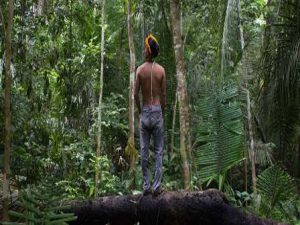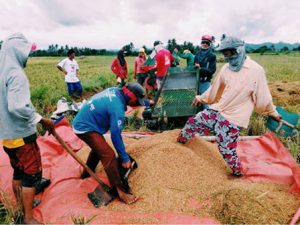Secure Land Rights Critical for Asia’s Rural Communities Threatened by COVID-19
Land rights as human rights is facing new challenges in the time of COVID-19 and securing land rights mean resilience for rural communities in Asia in the face of the pandemic.

The COVID-19 pandemic has swept across the globe overwhelming health systems and causing distress among millions of people. The total number of confirmed COVID-19 cases has reached almost 1.7 million as on 12 April 2020, with over 200,000 of these (13 per cent) located in Asia and the Pacific. Over the past two months, governments have scrambled to address local manifestations of this pandemic through travel restrictions, curfews, community quarantines, and nationwide lockdowns. However, the implementation of these measures has been partially successful or we are yet to know the impact of the spread of the pandemic. In Asia, civilians and activists alike point out shared observations of increased militarisation and aggressive policing, government crackdown on dissent, insufficient support for the health sector, absence of mass testing, and the inadequacy of support and protection for disadvantaged groups.
The subsequent measures to quell the spread of COVID-19 have been disproportionately impacting the poor and marginalised. Vulnerable groups not only face greater risks of being infected by the virus, but they also have less resources that would allow them to cope with the disruption of socioeconomic normalcy. Among those rendered most vulnerable during these times are those with insecure land rights. In these circumstances, it becomes clear how land rights are unequivocally tied to the fulfilment of other human rights such as the right to shelter, food, livelihood and health.
Also Read : Land Rights As Human Rights Asian Csos Embark On Land Conflict Monitoring Initiative
Vulnerability from insecure land rights
The unavailability of decent, adequate and affordable housing, especially in urban areas, lead households to dwell on streets or settle in small, cramped areas, often with poor sanitation. Homeless persons and slum-dwellers are therefore at high risk of contracting and transmitting the disease. Homeless persons lack the physical means to #StayHomeStaySafe, practice social distancing, and to sanitize. This concern is heightened in dense urban places such as New Delhi (India). The homeless’ outdoor presence may then be interpreted as defiance of government policies, as was the case during several arrests that occurred while Manila (Philippines) has been on community quarantine.
Displaced communities and refugees face similar threats. Driven away from their land by corporate land conflicts or armed conflicts, displaced groups are physically removed from their sources of livelihood and food. With nationwide lockdowns in place, these people cannot even subsist on their own produce. They reside in evacuation centres and settlements that are crowded and lack regular access to clean water, making social distancing and regular hand-washing impossible. Further, these groups now also experience greater competition for health and food assistance. Such is the case for the 1 million Rakhine State refugees settled in Cox’s Bazar in Bangladesh, and the thousands of Asian indigenous peoples displaced from their ancestral lands to make way for corporate investments.
While access to food is restricted for all persons in quarantine, this struggle is intensified for the above-mentioned groups as well as for farmers and farm workers who do not have their own land.
With work being suspended, seasonal and regular farm workers have no access to income sources. Tenants and farm workers are also presently restricted from accessing their farmland, and are unable to harvest crops for their household’s consumption.
Small Landholders hit hard

Nationwide lockdowns and restrictions on trade and travel have disrupted local and international food chains. These in turn have crippled the livelihoods of small farmers and producers across Asia, where agriculture remains the backbone of nations’ economies.
As roads are closed and public transportation are shut down to contain the spread of the virus, bringing produce to buyers has been the primary logistical obstacle for farmers. There is also a notable drop in demand from both local and international markets caused by limited mobility, decreased purchasing power, halting of operations of mills, restaurants, hotels, other agriculture-dependent industries, and international trade restrictions.
Small farmers who feed the world now worry about how they might have enough food for themselves and their families. Many have resorted to subsisting on their own crops as they have not been able to sell their harvest. Their financial resources are tightened further by the suspension of non-farm and off-farm activities, which previously served to supplement small producers’ income.
In Indonesia, the agriculture sector contributes to 13.6 per cent of the country’s GDP in 2018, which is now being threatened by the COVID-19 outbreak. Farmers across the country brace themselves for the possibility of a food crisis, especially since they face difficulty in selling or transporting their crops.
Crops have also been going to waste while Asia battles with short- and long-term concerns regarding food insecurity and malnutrition. In the Philippines, farmers have thrown away vegetables due to the lack of buyers during the Luzon-wide community quarantine. Farmers in India have reported using their crops as fertilizer and feeding strawberries and broccoli to their cattle. Small producers in Laos, on the other hand, have been feeding their cabbage to chicken.
Civil society organisations have been mobilising response efforts for farmers and other sectors affected by the crisis. The Consortium for Agrarian Reform (KPA), peasants’ rights organisation based in Jakarta, Indonesia and a member of ANGOC, has been helping farmers distribute their crops from rural areas to marginalised groups in urban cities. They do so by cooperating with labour unions in cities, whose members are on the brink of unemployment since many factories have been shut down. KPA is raising awareness regarding COVID-19’s impact and the importance of complying with the Indonesian government’s policies during the pandemic while distributing staple food packages to factory workers in urban areas.
Continued attacks on land rights and human rights defenders

Meanwhile, corporate activities in the countryside have persisted. Oil palm plantations in Indonesia and mining sites in the Philippines remain operational, raising green groups’ concerns over unchecked environmental destruction. Attacks on land rights defenders have also been recorded amid national lockdowns. In the province of Nueva Vizcaya in the Philippines, a large-scale mine under Oceanagold attempted to refuel its operations, despite the expiration of its Financial and Technical Assistance Agreement (FTAA) in June 2019. A peaceful barricade against the attempted refuelling of the mine was violently dispersed by police on 7 April 2020, leading to the arrest of environmental activist Rolando Pulido.
On 19 March 2020, during the first week of the Luzon-wide quarantine in the Philippines, Gloria Tomalon, indigenous people’s advocate and National Anti-Poverty Commission council member, was arrested in Surigao del Sur. Tomalon has been charged with kidnapping and serious illegal detention, and is being accused by state forces of being a leader of the insurgent New People’s Army. Two days prior, 25-year old Marlon Maldos, a peasant advocate and cultural worker, was shot dead by unidentified assailants in the province of Bohol. Prior to his demise, the Philippine military had been claiming that the young activist was an active supporter of the New People’s Army.
No wonder, why the Philippines has been considered by environmental watchdog Global Witness as the deadliest place for land and environmental defenders.
The described incidents accompany a time when countries such as Bangladesh, India, the Philippines, and other Asian nations have been turning to increased use of state armed forces to implement strict lockdowns and curfews. Tension and anxiety escalate for populations already in the throes of militarisation, as in the case of numerous Asian rural communities opposing government or corporate development of their land.
Additionally, civil society in some Asian countries also report active repression of criticism on state responses to the pandemic. In Bangladesh, at least a dozen activists and students have been arrested for allegedly spreading false news regarding the COVID-19 situation. Similarly, individuals in the Philippines who have vocally expressed concerns regarding the government’s actions have feared the suppression of free speech, as the National Bureau of Investigation polices the internet for online misinformation that have a tendency to disrupt public order.
Also Read : Covid 19 In India Immense Role For Healthcare Field Workers
Concerns for actions by governments
Governments across Asia must pay a closer attention to marginalised groups of people who bear the brunt of the pandemic. Apart from the huge economic loss such as rising unemployment for those who work informal jobs, rural communities also face limited to basic necessities such as food and clean water. For smallholder farmers, the burden to provide fresh and adequate produce to households is becoming more evident. During quarantines and lockdowns, governments across the region should provide special incentives for small land holders and family farmers who continue their food production, especially as during critical periods of planting and harvesting. There are concerns that the governments have to ensure the delivery of basic needs such as food, medicines, and WASH (water, sanitation and hygiene) for all. Governments also should consider special conditions of vulnerable populations and provide appropriate social safety nets especially for the poor, elderly, disabled, the displaced and homeless. It is significant that the governments prevent the pandemic crisis turning into a food crisis by ensuring availability, access, utilisation and stability of safe and nutritious food.
In the light of reported incidents across the countries of aggressive policing and police/paramilitary excesses during the lockdown and curfews, there should be measures to hold state armed forces such as police, military and paramilitary accountable, especially in cases of violations of human rights in the context of the enforcement of quarantines and lockdowns.
Another area of concern to deal with is that the opportunistic advances by businesses and government agencies intending to encroach on the land and resource rights of communities. How COVID-19 is affecting those working on land may seem like a stretch to some of us, but as land provides security, productivity and opportunity, it has become a critical instrument to protect the most vulnerable groups in the face of a pandemic. In an unprecedented time like this, we are reminded of regional solidarity that responds to the immediate impacts of the crisis. Governments must work shoulder-to-shoulder with civil society if we are to survive this pandemic and strive for a more sustainable world for all.
(Slider Photo: A female Nepali farmer continues with agricultural activities in the midst of the COVID pandemic. Photo by Kumar Thapa, CSRC, Nepal)
(Denise Hyacinth Joy Musni and Timothy Salomon are with ANGOC, The Philippines. Andita Listyarini is with International Land Coalition (ILC) Asia, Jakarta, Indonesia.)
